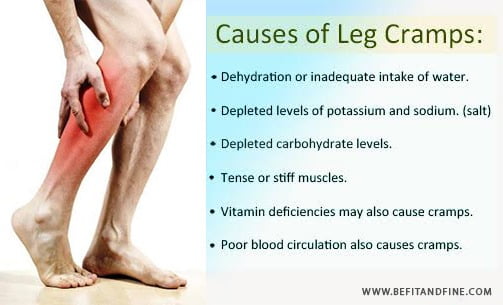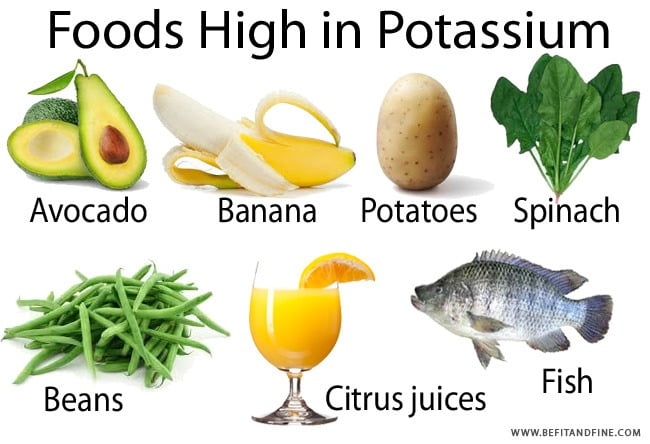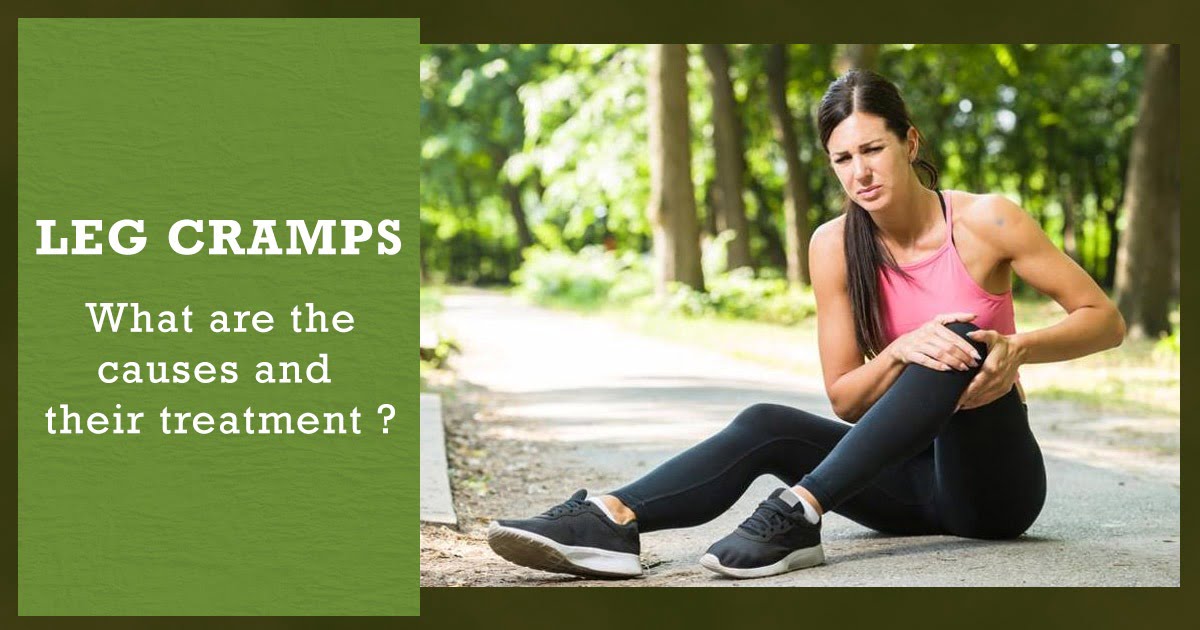You are running on a treadmill and all of a sudden you feel a sharp pain in your leg. You stopped there itself and felt a hard lump at the point of pain — that’s the contracted muscle. Have you ever experienced this situation? These sudden, painful involuntary contractions or spasms of muscles in your legs are LEG CRAMPS.
Leg cramps can strike anytime. It can stop you in the middle of a workout, bother you while you’re at work or wake you up in the middle of the night. Cramps most commonly hit your calves and hamstrings, although it can affect any part of your leg, including your feet and thighs.

Almost everyone experiences a leg cramp at some time in their life. It tends to happen more frequently as we age. Although the cause of leg cramps isn’t always known. They may be brought on by many conditions or activities. Let’s have a look.
CAUSES OF LEG CRAMPS
DEHYDRATION
Being dehydrated means that your body has lost too much fluid. It can occur in athletes when they exercise hard in hot conditions and do not drink sufficient liquid. Low levels of water in the body can lead to a drop in salt levels which can trigger muscle cramps.
MINERAL DEPLETION
There are four minerals that can influence how muscle contracts and help it work more smoothly, namely calcium, potassium, magnesium, and sodium.
CALCIUM is an electrolyte involved in nerve function, muscle contraction and relaxation.
POTASSIUM is an electrolyte responsible for conducting nerve impulses in the body. It plays a key role in muscle contraction.
MAGNESIUM is an important electrolyte because it is involved in the movement of calcium and potassium into and out of cells, which affects muscle contractions
SODIUM works together with the other electrolytes ( potassium, magnesium, and calcium ) to generate proper nerve impulses and muscle contractions.
Fluids help your body process the minerals and dehydrated body results in electrolyte imbalance. But don’t overdo the fluid intake because excessive intake of fluid (drinking 2-3 liters or more of water in addition to your daily fluid intake) can wash-out the above-mentioned minerals out of your body and lead to cramps. Diet deficient of these minerals and diuretics — medications also can lead to mineral depletion.
OVERUSE OF A MUSCLE
Muscle fatigue or strain from overuse, vigorous exercise, simply holding a muscle in the same position for a prolonged period can cause a muscle cramp. Like standing on a hard surface for a long time, sitting for a long time, or keeping your legs in awkward positions while you sleep.

MEDICATION
Muscle cramps can also occur as a side effect of certain medicines like antipsychotics, birth control pills, diuretics, statins, and steroids.
If you think your medication may be causing your leg cramps, contact your healthcare professional as your dosage may need to be adjusted. Never stop taking a prescribed medication unless your doctor who is responsible for your care advises you to do so.
MEDICAL CONDITIONS
- Neurological conditions like motor neuron disease or peripheral neuropathy that affect the nerves in your leg muscles.
- Inadequate blood supply: Poor circulation to the legs, which results in inadequate oxygen to the muscle tissue, can cause severe pain in the muscle (sometimes known as claudication pain or intermittent claudication) that occurs with walking or exercise.
- Infection: some types of bacterial infection, such as tetanus, can cause muscle cramps and spasm.
- Toxins: in some people, high levels of toxic (poisonous) substances in the blood, such as lead or mercury, can cause leg cramps. If your liver stops working properly, toxins will build up in your blood, which can make your muscles go into spasm.
- Nerve compression: Compression of nerves in your spine (lumbar stenosis) also can produce cramp-like pain in your legs.
- Other medical conditions like kidney disease, hypothyroidism, diabetes, and flatfeet etc. are known to cause leg cramps.
PREGNANCY
Cramps may occur because of decreased amounts of minerals, such as calcium and magnesium, especially in the later months of pregnancy. The extra weight of pregnancy can sometimes place a strain on the leg muscles, making them more vulnerable to cramping.
A less-known cause for leg cramping: ‘YOUR SHOES‘. Yes, you really need to look at your shoes, especially if you have changed from flats to heels. Wearing high-heeled shoes for lengthy periods can cause leg cramp.
TREATMENT OF LEG CRAMPS
MOVE YOUR LEG
The best method to relieve leg cramps is movement. Move your leg, either walk around or simply jiggle or shake your leg. In addition, ankle pumps like moving your ankles up and down or rubbing the muscles can help as well.
COLD COMPRESSION
Some people with chronic leg cramps have found relief using cool compresses which works by numbing pain and reducing soreness while relaxing the muscles.
For cold compression, hold an ice pack (ice cubes wrapped in a towel) to the affected area of your leg. Always keep a cloth between your skin and the ice pack. Place it there for 15 minutes and repeat thrice a day.

STRETCH AND MASSAGE YOUR MUSCLES
The calf muscle is the most common location for leg cramps. Stretching the calves helps to get rid of leg cramps by easing the spasms.
- TOWEL STRETCH
- STAIR STRETCH
- WALL STRETCH
For complete details and pictures of these stretches, read Causes and treatment: PLANTAR FASCIITIS (HEEL PAIN)
Stretch your muscles every day, especially before and after exercise and at bedtime.
A gentle massage followed by a hot bath will relax even the most persistent lingering cramp. Instead of a shower, you can use a heating pad also. It works by relaxing the tightened muscle.
INCREASE YOUR FLUID INTAKE
Drinking plenty of water is essential since cramps are often caused by dehydration. If you tend to get muscle cramps during exercise, drink at least 2 cups of water 2 hours before each workout then keep on sipping during exercise sessions. If you’re sweating a lot, consider a sports drink like Gatorade, it replaces lost sodium and other electrolytes in your body. Increasing fluid intake in forms of soups, juices, tea etc. will help to rehydrate your body and thus get rid of leg cramps.
DIET RICH IN VITAMINS AND MINERALS
Make sure you are eating healthy foods (especially if you are pregnant) that are rich in calcium, potassium, and magnesium. Good food sources of magnesium are whole-grain bread and cereals, nuts and beans. You can get potassium from most fruits and vegetables, especially bananas, oranges, and cantaloupes. The old adage that eating bananas combat leg cramps is true: bananas are highly rich in potassium. Dairy foods supply calcium. A healthy diet with plenty of fresh fruits and vegetables can help to decrease the frequency of leg cramps.

MEDICATION
Take over-the-counter pain medicines like ibuprofen and naproxen. Don’t forget to take a daily multivitamin supplement, if required.
Leg cramps usually disappear on their own and are rarely serious enough to require medical care. If they persist even after following the above line of treatment, consult your doctor.

I like to suggest a simple remedy for cramps, I find it easy and effective and have recommended to many. Just take spoon full of ground sauf (fennel seeds,) put it in your mouth and gulp it with water, carefully so it doesn’t make you cough. Try and let me know.